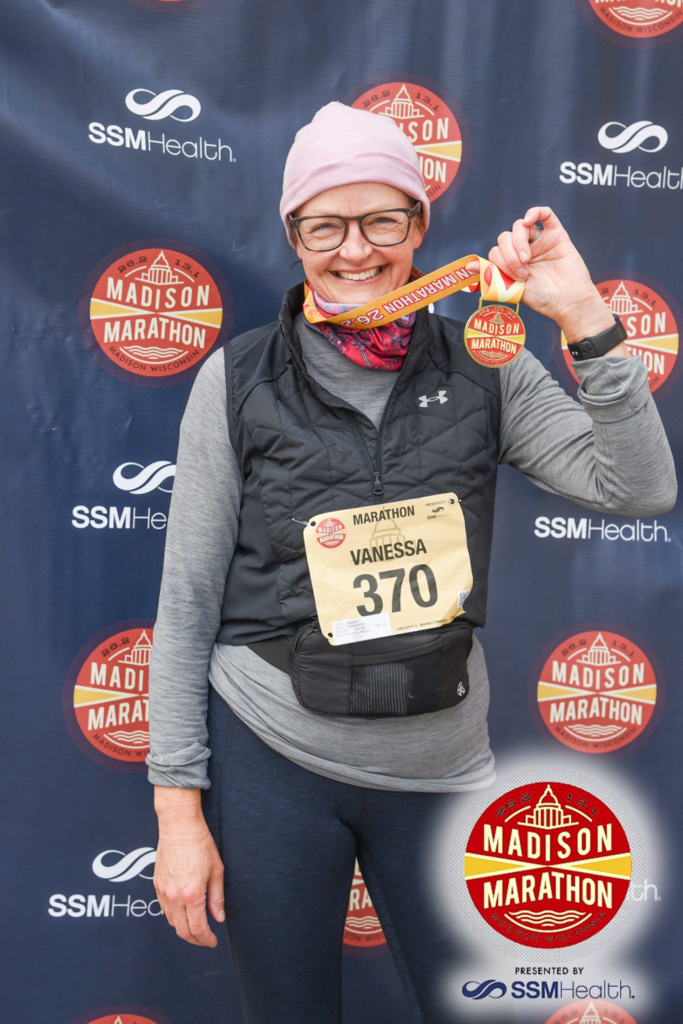What inspired Vanessa Griffin to run her first marathon at 50 years old and raise money for a Citizen Potawatomi Nation scholarship? In part, it was the bestselling book Braiding Sweetgrass, written by CPN tribal member Dr. Robin Wall Kimmerer.
Getting the idea
Griffin joined fellow parishioners at her church reading books and educating themselves on racism in the United States.
“As I did that work and kind of did some self-examination, one of the things I was reflecting on was, ‘What can I personally do?’” Griffin said.
That thought brought her to the idea of a marathon — what Griffin considers to be one of the few things in a polarized society that everyone can get behind.
Griffin took up running when she was 40, completing 5ks and half marathons, but never a full marathon. She decided to try to help make a difference by running her first one to raise money.

Choosing a cause
When deciding who should benefit from any money she raised, she was strongly influenced by Dr. Kimmerer’s Braiding Sweetgrass.
“When you train for a race, you are signing up to spend many hours in nature,” Griffin said. “I sometimes listen to audiobooks and podcasts while I run on forest preserve trails, and there is no better companion than Dr. Kimmerer’s calming, wise voice while running through those landscapes. She helps you absorb the world in a deeper, more complex way.”
Griffin said the book also brought home the knowledge that she lived on land that once was home to the Potawatomi people.
“Dr. Kimmerer’s chapter on pecan trees … that is one of the most beautiful essays I’ve run across. It’s such a beautiful expression of the importance of place and the grief that is involved when a people are relocated from one place to another that is so different from an ecological standpoint,” Griffin said.
Though she wanted to help raise awareness about the removal of the Potawatomi people, Griffin also researched where the Citizen Potawatomi Nation is today and its headquarters in Oklahoma.
“I came back to the idea that the Citizen Potawatomi Nation exists. That is where the Potawatomi Nation was forcibly and violently relocated to, and that is where they have their home. And there is beautiful work going on there,” she said.
With that in mind, Griffin called the CPN Department of Education and spoke to former Education Director Tesia Zientek and Interim Education Director Charles Lee III.
“I had a very, I’ll call it a ‘white lady’ idea, which is I’d like to create a scholarship,” she said. “I came to Tesia and Charles with this grandiose proposition of a new scholarship, and they very gently, very calmly said, ‘That’s a great idea. We love that idea. Thank you. But what would really help us is if you donated to this other scholarship that’s already established and exists.’”
Zientek and Lee told Griffin about the Michael John Kennedy Scholarship, which was established in 2021 to honor Citizen Potawatomi Nation veteran Michael John Kennedy. Each year, the scholarship awards $1,000 to a CPN tribal member who is a veteran or the child or grandchild of a veteran, with applications taken from July 15 to Sept. 15.
“My understanding is that he was so committed to the idea of education that he really wanted it to be passed on to new generations,” Griffin said. “I love the fact that there is a connection to someone who believes deeply in the power of education.”
Completing the race
Griffin trained for about six months before running in the Madison Marathon in Madison, Wisconsin, in November 2022.
“It went really well,” she said. “I prefer to run in the cooler weather rather than the heat of the prairie summer. It was a little cold, but there was no precipitation.”
Her goal was to finish the marathon and raise $5,000, with a stretch goal of finishing the marathon in less than 5 hours. She was able to finish in 5 hours, 13 minutes, and she ultimately raised $6,500.
“It’s a little mind blowing. I’m somebody who, for the first 40 years of my life, only ran when chased,” Griffin joked. “I think that might be part of the success of the fundraiser. I think a lot of people in different walks of my life, maybe before my 40s, were like, ‘She’s doing what? We’ll give her five bucks!’”
Though Griffin said it is too soon to think about if she will do another marathon — she likened being asked so soon to asking a new mother when she’ll have her next baby — she found it empowering.
“If feels so big when you haven’t done it yet, but if you have achieved that goal and you can look back on it and say, ‘Well, I spent that many hours doing that. What am I going to do with the next however many hours?’ It’s sort of a good puzzle to have before you,” she said.
Griffin said she does want to continue to educate herself and others about the country’s history.
“This has allowed me to be a little more public with this interest in understanding and learning from and moving past, in healing ways, the hard histories of our nation. I think those are hard conversations for a lot of people to have, and I hope I am opening the door gently, always, in all the projects that I work on,” Griffin said.
She feels honored to have worked with Zientek and Lee to benefit the MJK Scholarship.
“They were so kind and responsive,” she said. “They just have these beautiful, open spirits, and I just was so honored to partner with them.”
To learn more about the Department of Education or the MJK Scholarship, visit cpn.news/education or portal.potawatomi.org, or on Facebook at facebook.com/CPNEducation.
